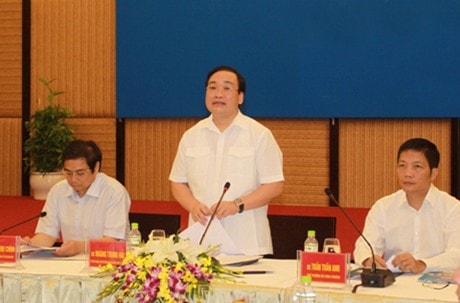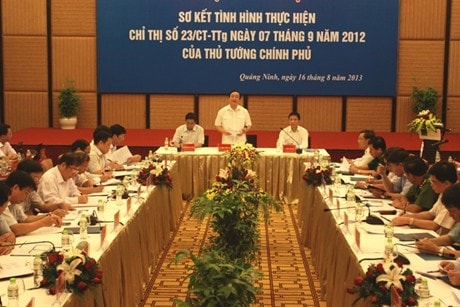Innovation in temporary import and re-export policy
Measures to prevent exploitation for smuggling and trade fraud, and at the same time remove shortcomings in the policy on temporary import and re-export are being urgently completed by the relevant agencies to submit to the Government.

Deputy Prime Minister Hoang Trung Hai chairs a meeting on the implementation of Directive No. 23/2012/CT-TTg. Photo: VGP/Nguyen Linh
On the morning of August 16, in Quang Ninh, Deputy Prime Minister Hoang Trung Hai chaired a meeting with management agencies, border localities, and commercial enterprises on the actual implementation of Directive No. 23/2012/CT-TTg dated September 7, 2012 of the Prime Minister on strengthening the management of temporary import for re-export (TNTX), transit, and bonded warehouse business activities.
Timely rectification of temporary import and re-export activities
Directive No. 23/CT-TTg is considered a necessary solution to address emerging shortcomings in temporary import and re-export (TNTX) business activities in trade.
Before 2012, taking advantage of loose management regulations, TNTX businesses smuggled, committed commercial fraud, illegally transported goods across borders, and TNTX goods prohibited under international conventions that Vietnam participated in such as the CITES Convention, Basel Convention, etc.
According to the discovery of the authorities, many cases of enterprises opening declarations to register export routes and locations but not actually exporting through these points, arbitrarily breaking customs seals, transferring or transporting goods through trails and shortcuts where there is no supervision force, and declaring incorrect names, types, quantities, weights, and characteristics of goods in some TNTX shipments.
Enterprises also said that in TNTX activities, many enterprises are also passive in transactions, there are times when it is difficult to export goods and there is a large backlog at ports and border gates. On the other hand, due to the lack of specific conditions and criteria, there is a situation where many small and weak enterprises also participate in TNTX with unfair competitive tactics, competing for customers, and lowering service costs.
With the issuance of Directive 23, the situation of TNTX has been rectified by limiting the number of items allowed to trade TNTX. Hazardous waste, banned scrap plastic, by-products, viscera of livestock and poultry, and used consumer goods have been temporarily suspended. On the other hand, the policy also strictly regulates re-export border gates, adds conditions for TNTX traders, strengthens management and supervision measures for goods such as specific regulations on bills of lading, time of storage of goods, etc.
In general, the implementation of Directive 23 after 1 year has promptly rectified TNTX business activities, prevented the exploitation of prohibited goods and trade fraud, and prevented the illegal transportation of goods that violate international conventions.
In addition, some businesses and localities also reflected and proposed some contents in the policy to continue to rectify and strictly manage TNTX business, while creating more favorable conditions and promoting the advantages of this type of business. In fact, in recent times, many border gates have become quiet, the volume of goods has decreased sharply, affecting the economic, trade and people's lives in many areas.
That is the issue of re-export gates needing to be expanded for used goods, lifting the temporary suspension of TNTX business for livestock and poultry by-products as well as some goods with high trade demand but low smuggling potential, and being flexible with the storage period of goods suitable to the characteristics of each item...

Overview of the meeting. Photo: VGP/Nguyen Linh
Quickly remove the problem
Listening to the opinions of businesses and management agencies on the implementation of strengthening the management of TNTX business activities, transit, and bonded warehouses, Deputy Prime Minister Hoang Trung Hai agreed with the analysis and assessment of both the positive and negative aspects of the management policy in the past time. From there, he directed measures and orientations to make the policy more effective in managing this vibrant and complicated field.
Considering this as a normal and popular business activity in international trade, the upcoming TNTX business management policy will continue to implement measures to prevent exploitation for smuggling and trade fraud, while at the same time removing current shortcomings that cause congestion for normal goods, which can control quality and are less vulnerable to smuggling.
The Deputy Prime Minister agreed to consider and be more flexible in the issue of border gates and storage time for goods for businesses, while continuing measures to prohibit transfer and division of containers, and strengthening customs supervision in TNTX business by increasing the inspection rate and raising the deposit value.
The story of planning the number of focal points and strict punishment such as permanently revoking the licenses of TNTX enterprises that smuggle TNTX goods into the country was also raised by Deputy Prime Minister Hoang Trung Hai for localities, ministries and branches.
It is expected that the new policy will be completed by the Ministry of Industry and Trade to report to the Government for consideration and decision soon in the near future.
According to Chinhphu.vn - LT






